
In this update:
- ‘Meet the Cabinet’ series recap
- Redistricting / Impeachment Updates
- Legislative Updates
‘Meet the Cabinet’ series recap
DNR Secretary Adam Payne featured guest at MBS luncheon
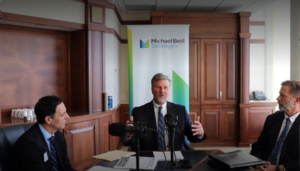
Michael Best Strategies hosted Wisconsin Department of Natural Resources (DNR) Secretary Adam Payne at the Madison Office on Wednesday as part of our ‘Meet the Cabinet’ series of events. Secretary Payne met with clients, answered questions, and spoke about priorities for the DNR going forward. Sec. Payne emphasized his commitment to ensure businesses across the state have the clarity and consistency they need to be successful. However, he stressed that for businesses to get the permits they need, DNR needs the staff and resources to process applications in an efficient and timely manner. Sec. Payne also provided an update on efforts to address PFAS and improve water quality, manage the state’s wolf population, and increase engagement with local governments.
Redistricting / Impeachment Updates
Legislative redistricting and impeachment round-up
It was a busy week in the State Capitol on the legislative redistricting and impeachment front. Of note were the following:
Court to hear redistricting case
- The Wisconsin State Supreme Court (SCOWIS) ruled 4-3, with conservatives dissenting, to hear a lawsuit filed in August by 19 Wisconsin residents challenging the state’s legislative maps. In the order from the court, the four liberal justices said they would agree to hear two of the issues alleging constitutional violations. One of the issues is whether the current maps violate the state constitution’s requirement that districts must be contiguous, while the other is whether the maps violate the separation of powers. Following the court’s ruling, Gov. Tony Evers (D) instructed Attorney General Josh Kaul to file a motion to intervene so the governor could become a party in the lawsuit. “My commitment to the people of Wisconsin remains the same—I believe that the people should get to choose their elected officials, not the other way around, and that includes making sure legislators cannot abuse their power and manipulate the redistricting process to try and keep their power,” Gov. Evers said in a press release announcing the motion.
- According to the lawsuit challenging the legislative maps, 55 assembly districts and 21 senate districts violate a straightforward and express constitutional requirement because they are noncontiguous, with detached pieces scattered in surrounding districts. Also, according to the lawsuit, the maps violate the separation of powers limitation because when selecting the new maps in 2022 during the redistricting process, the state Supreme Court chose “the precise maps the Governor vetoed—a veto that the legislature failed to override.” The suit claims that by judicially overriding Gov. Evers’ veto, the Court “transgressed separation-of-powers boundaries and impermissibly intruded upon core powers of the executive and legislative branches.” The suit argues the maps are such an extreme partisan gerrymander that all 33 members of the state Senate should face re-election in 2024, which would mean all 132 seats in the Wisconsin State Legislature would be up for re-election in 2024.
- Dan Lenz, Staff Counsel at Law Forward, the firm representing the group who filed the lawsuit, released a statement praising the court’s decision to hear the case. “Friday’s order represents a win for all of our communities whose voices have been silenced for the last 12 years, for our state, country, and for the future of Wisconsin,” Mr. Lenz said. “For democracy to work for us all it must include us all, and we are very proud to be a part of this important effort to ensure our elected representatives represent us instead of trying to rule over us.”
Protasiewicz rejects calls to recuse
- Prior to the court accepting to take up the redistricting suit, Supreme Court Justice Janet Protasiewicz announced she would not recuse herself from the case, despite calls from GOP lawmakers to do so. “Allowing politics or pressure to sway my decision would betray my oath and destroy judicial independence,” Justice Protasiewicz wrote in an opinion denying the motion to recuse. “As Justice Prosser has warned, unjustified recusal can affect the integrity of the judicial branch.” Republican legislators had called on Justice Protasiewicz to recuse because during the election, she had called the state’s legislative maps “rigged” and on a different occasion said she would “enjoy taking a fresh look at the gerrymandering question.” During the campaign, Justice Protasiewicz also received nearly $10 million in campaign contributions directly from the state’s Democratic Party, which Republicans alleged is the “interested party” in the redistricting case.
Reaction from lawmakers
- Assembly Speaker Robin Vos (R): “Justice Protasiewicz should have recused herself. We think the United States Supreme Court precedent compels her recusal, and the United States Supreme Court will have the last word here. Justice Protasiewicz is asking to be taken at her word that she will apply the law. Given the Wisconsin Supreme Court is limiting its review of the redistricting case to two questions, legal contiguity and separation of powers, applying the law should be straightforward. The Wisconsin Supreme Court addressed these very questions less than two years ago, and the law remains the same.”
- Senate Majority Leader Devin LeMahieu (R): “Justice Protasiewicz made the wrong decision and tried to hide it from Wisconsinites by releasing it on a Friday evening. Her rulings on cases that she has pre-judged will cast doubt on the legitimacy of the court. Wisconsinites deserve better.”
- Senate Minority Leader Melissa Agard (D): “Justice Protasiewicz is absolutely correct to not recuse herself from the redistricting case before the Wisconsin State Supreme Court. As a duly elected Justice who won by a staggering 11 points, she has been entrusted to carry out her duties on the bench. Despite Republican’s desperate efforts to hold onto their gerrymandered majority, their push for recusal was never more than a blatant political maneuver and an effort to ignore the will of the people.”
Two former justices advise Vos not to impeach
- In September, Speaker Vos asked three former state Supreme Court justices to provide him with their opinions on the potential impeachment of Justice Protasiewicz. Specifically, Speaker Vos asked the former justices to “review and advise what the criteria are for impeachment” of Justice Protasiewicz if she declined to recuse herself from the legislative redistricting lawsuit. In a court filing last week, Speaker Vos identified the three former justices as Justice David Prosser, Justice Patience Roggensack, and Justice Jon Wilcox. This week, both Justice Prosser and Justice Wilcox acknowledged they had advised Speaker Vos not to impeach Justice Protasiewicz. Justice Roggensack has not yet publicly commented on whether she recommended impeachment.
- In a letter addressed to Speaker Vos, Justice Prosser said he saw no evidence that Justice Protasiewicz has engaged in “corrupt conduct in office.” “To sum up my views, there should be no effort to impeach Justice Protasiewicz on anything we know now,” Justice Prosser wrote. “Impeachment is so serious, severe, and rare that it should not be considered unless the subject has committed a crime, or the subject has committed indisputable “corrupt conduct” while ‘in office’.” Justice Wilcox agreed with Justice Prosser’s recommendation not to impeach. “I do not favor impeachment,” Justice Wilcox said in a telephone interview. “Impeachment is something people have been throwing around all the time. But I think it’s for very serious things.”
Vos says impeachment not off the table
- Despite two former state Supreme Court justices advising him against it, Speaker Vos revealed during a press conference prior to Thursday’s Assembly floor session that impeaching Justice Protasiewicz was still a possibility. Asked by a member of the media whether the impeachment of Justice Protasiewicz was “off the table,” Speaker Vos responded “No. Absolutely not.” However, Speaker Vos said his decision on whether to move forward with impeachment would be based on how Justice Protasiewicz conducts herself while judging the legislative redistricting case. “If they decide to inject their own political bias inside the process and not follow the law, we have the ability to go to the U.S. Supreme Court,” Speaker Vos said, “and we also have the ability to hold her accountable to the voters of Wisconsin.”
Kaul seeks to prevent GOP from replacing elections administrator
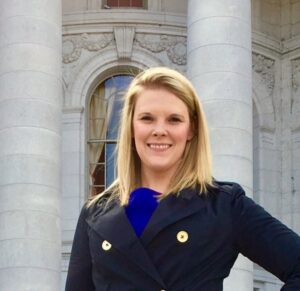 The Department of Justice asked a Dane County judge to issue an order to prohibit Republican lawmakers from replacing elections commission administrator Meagan Wolfe while litigation is pending on whether Ms. Wolfe remains a lawful holdover. Judge Ann Peacock was asked to rule on the request before the next elections commission meeting on November 2nd. The filing is intended to block the Joint Committee on Legislative Organization (JCLO) from replacing Ms. Wolfe by appointing a new administrator, which it can do if the position is vacant for 45 days and the commission does not appoint a replacement. Speaker Vos said as recently as last week that Ms. Wolfe does not legally occupy the administrator position and that JCLO should name a replacement. Similar to Attorney General Kaul’s lawsuit, the filing claims there is no vacancy to fill and that Ms. Wolfe remains a lawful holdover, citing a 2022 State Supreme Court ruling that found a member of the Natural Resources Board can remain until the Senate approves a replacement.
The Department of Justice asked a Dane County judge to issue an order to prohibit Republican lawmakers from replacing elections commission administrator Meagan Wolfe while litigation is pending on whether Ms. Wolfe remains a lawful holdover. Judge Ann Peacock was asked to rule on the request before the next elections commission meeting on November 2nd. The filing is intended to block the Joint Committee on Legislative Organization (JCLO) from replacing Ms. Wolfe by appointing a new administrator, which it can do if the position is vacant for 45 days and the commission does not appoint a replacement. Speaker Vos said as recently as last week that Ms. Wolfe does not legally occupy the administrator position and that JCLO should name a replacement. Similar to Attorney General Kaul’s lawsuit, the filing claims there is no vacancy to fill and that Ms. Wolfe remains a lawful holdover, citing a 2022 State Supreme Court ruling that found a member of the Natural Resources Board can remain until the Senate approves a replacement.
Kapenga says Senate lacks votes to pass GOP redistricting bill
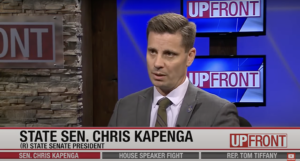
During an interview on ‘UpFront,’ Senate President Chris Kapenga (R) said there are not enough votes in the Senate to pass AB 415, a GOP proposal that would overhaul the state’s current system for determining legislative maps and have new maps in place by the 2024 elections. The plan was introduced in the wake of the state Supreme Court’s new liberal majority and was labeled by Speaker Robin Vos (R) as an “off-ramp to impeachment.” The bill already passed the Assembly 64-32 with Rep. LaKeshia Myers (D-Milwaukee) joining all Republicans in support. However, during the interview on ‘UpFront,’ Sen. Kapenga acknowledged GOP senators currently lack the votes needed to pass the bill. “We’re having those discussions internally to determine is this direction the direction we want to go? There are two sides to it, one is that this is an action we could take, and it could possibly make the process better,” Sen. Kapenga said. “The other side of that discussion is we have passed maps. The Supreme Court of the United States has said they followed the procedure, so that’s the debate going on right now. We just have to figure out the best course of action. There are not the votes in the Senate right now to pass that legislation.”
Gov. Tony Evers has previously indicated that he would veto the GOP redistricting plan should it pass the legislature.
Legislative Updates
Assembly committee approves Brewers stadium funding deal
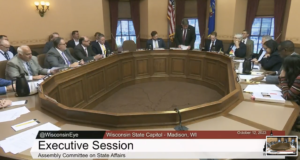
The Assembly Committee on State Affairs voted 13-1 in favor of two amendments made to AB 439 and AB 438, a package of bills that would fund upgrades and repairs to the Brewers stadium and keep the team in Milwaukee until at least 2050. One amendment would reduce the local contribution from the city and county of Milwaukee to $135 million, with the cost being evenly split between the two over the next 27 years. The other amendments would change the way in which the city would contribute its share of the funds by reducing the administrative fee the state DOR charges the city to collect the local sales tax. Under the proposal, DOR would take 1% of the 1.75% fee it currently collects from administering the city’s sales tax and instead use it to fund the city’s $67.5 million share of the stadium deal. DOR’s cut of the city’s sales tax would be reduced to 0.75% after the city’s share of the funding deal is paid off. Also under the proposal, other local units of government with a sales tax would have their DOR administrative fees reduced to 0.75% from the 1.75% currently charged. Despite previous calls from some lawmakers, the amendments did not include a ticket tax or an audit of the stadium district.
Rep. Rob Brooks (R), the legislator tasked by Speaker Robin Vos (R) with putting the stadium funding plan together, said a deal could not have been done without the support of Gov. Tony Evers and other Democrats. “We’ve been negotiating this back and forth with the team, governor’s office, Democratic leadership,” Rep. Brooks said. “It’s been a lot of time to get to where we are today, to where we can truly say it does not have a negative impact. It’s not going to offset $1 in the levy.” Milwaukee Rep. Christine Sinicki (D) also indicated bipartisan negotiations were key to striking a deal. “I’ll give Vos a little bit of credit,” Rep. Sinick said. “I am very pleased with the amendment. It makes Milwaukee and Milwaukee County whole. It gives them a buffer, a little extra cash money.”
Prior to the committee vote, Speaker Vos said the Assembly is planning on a floor vote for the pair of bills “hopefully next week Tuesday.”
Senate committee approves $3 billion tax cut
The Senate Universities and Revenue Committee passed along party lines a $3 billion bill that would reduce the state’s third-highest income tax bracket, as well as expand an existing tax break on retirement income. SB 435 would reduce the state’s third-highest tax bracket from 5.3% to 4.4%, which would impact individuals with a taxable income between $27,630 and $304,170 and couples filing jointly between $36,840 and $405,550. For retirees over the age of 67, the bill also includes a tax exemption of up to $100,000 of income from qualified retirement accounts for individuals and up to $150,000 for married couples.
The Senate now has the option to either schedule a floor vote for SB 435, or it can choose to take up the Assembly’s version AB 386. The Assembly passed AB 386 along party lines and the Joint Finance Committee has also recently signed off on the bill. Republicans argue the tax cut makes Wisconsin more competitive since it makes the state’s taxes comparable to surrounding states. However, Democratic members say the tax cuts are a misplaced priority and the state should be attracting younger generations with paid family leave and support for the childcare industry.
Governor Tony Evers (D) has already promised to veto the bill should it be passed by the legislature.
Speaker’s AI task force holds first hearing
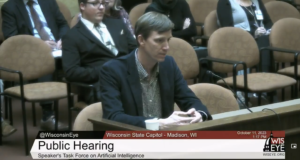
Assembly Speaker Robin Vos’ Taskforce on Artificial Intelligence held its first public hearing this week. The task force’s chairman, Rep. Nate Gustafson (R), said the taskforce was created to educate on the topic of artificial intelligence (AI) and potentially propose legislation based off the findings and recommendations that the task force receives. Testimony was given by representatives from Google, NCSL, Adobe, and SAS Analytics Software.
Read Michael Best Strategies comprehensive memo here for details on the public hearing.



